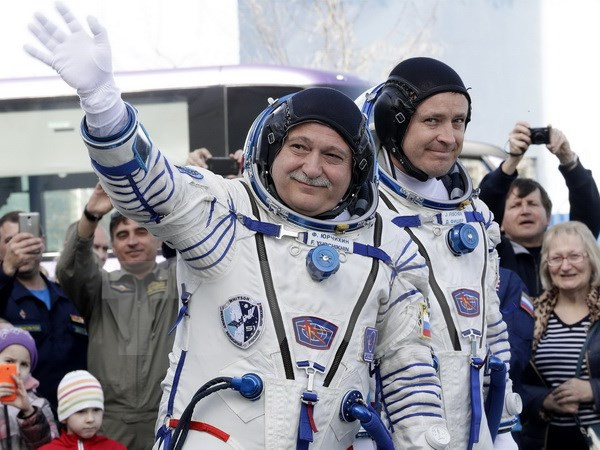Russia launched the Soyuz MS-04 spacecraft to the ISS International Space Station
On the afternoon of April 20, the Soyuz MS-04 Russian spacecraft carried two astronauts who were orbiting close to Earth and heading to the International Space Station (ISS).
According to the Russian Space Agency Roscosmos, Soyuz MS-04 was launched by Soyuz-FG rocket booster from Baikonur space airport, Kazakhstan.
The ship will fly to ISS according to a shortened diagram of 6 hours. This helps astronauts to the point of connection with ISS at 16:22 Moscow time (22:22 Vietnamese time) on April 20. Earlier, three flights of Soyuz MS class spacecraft took place on a two-day and night diagram.

The Soyuz MS-04 is accompanied by Russian astronaut Fedor Yurchikhin (left) and American astronaut David Fisher (right) and 70kg of cargo.(Source: AFP / VNA).
According to the original plan, Soyuz MS-04 will carry two Russian astronauts to ISS. However, Roscosmos decided from 2017 to reduce the number of Russian astronauts on ISS from three to two.
This regulation will apply at least until the fall of 2018. Meanwhile, the number of other travelers on the ISS will increase from three to four. The 3rd position in the Soyuz spacecraft MS-04 will be for foreign travelers. However, no astronaut has been trained for this position.
Currently on ISS is Russian astronaut Oleg Novisky, American astronaut Peggy Whitson and French astronaut Thomas Pesquet.
During nearly 20 years of operation, ISS has welcomed 226 people from 15 countries around the world. Experts conducted more than 180 walks in space, about 1,760 research investigations and published more than 1,200 scientific studies.
The control agency hopes to maintain the operation of ISS until 2024 after all countries join the cooperation, except for the European Union (EU), agreed to continue financial support for the project. at least until that point. ISS flies on Earth orbit at a speed of 28,000 km / h since 1998
- Russia launched Soyuz on the space station
- Russia launched TMA-06M onto the International Space Station
- Russia successfully launched the Soyuz-MS 09 spacecraft on the ISS station
- Russia successfully launched Soyuz on ISS
- Russia successfully launched the 500th Soyuz spacecraft
- Russia launched a spacecraft to bring 3 astronauts to ISS
- Video: Russian ship takes 3 travelers to the space station
- Spectacular scenery when Russian spacecraft are launched on ISS
- Video: Soyuz spacecraft docked at the ISS international space station
- Russia brought 3 Russian, American and Dutch astronauts to ISS
- After two months of delay, Russia launched a ship carrying people to space
- Russia continues to launch Soyuz spacecraft
 Van Allen's belt and evidence that the Apollo 11 mission to the Moon was myth
Van Allen's belt and evidence that the Apollo 11 mission to the Moon was myth The levels of civilization in the universe (Kardashev scale)
The levels of civilization in the universe (Kardashev scale) Today Mars, the sun and the Earth are aligned
Today Mars, the sun and the Earth are aligned The Amazon owner announced a secret plan to build a space base for thousands of people
The Amazon owner announced a secret plan to build a space base for thousands of people